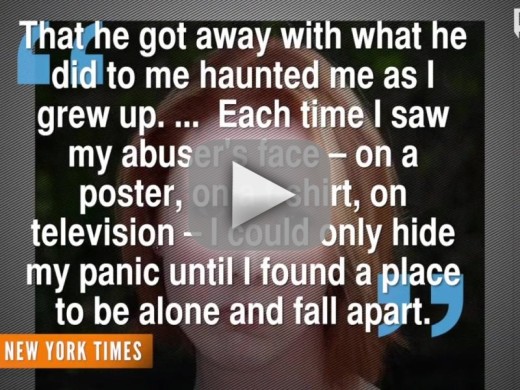By: Yolanda Catano, Contributor
Recent headlines have sparked much controversy in and outside of Hollywood for the February x issue of NYT.com, in which Dylan Farrow’s letter addressed Woody Allen.
The commentaries following the letter lends support to Farrow, and many of those commentaries described similar experiences of sexual abuse without the Hollywood light. I could not help but ponder the thought of how we could come to prove accusations of child abuse?
As a Mexican woman who experienced child sexual abuse at the age of seven, I can attest to the experience where, based on the lack of evidence that victims are sometimes unable to provide, we are questioned whether the alleged sexual abuse occurred. Alleged; interesting word. I cannot think of reasons why a seven year old would happen to give such a vivid story of the abuse and still be questioned. Now, I do understand that as a society we live under the Rule of Law, and we are to always be viewed innocent until proven guilty. What about if you cannot prove the guilt? It is a controversial subject, especially when concerning children.
Unfortunately for Farrow, there was no form of evidence that provided enough proof. Then there is the psychological effect of child abuse that arises issues well beyond evidence of proof. For example, in my case, I was sexually abused for a period of years. As a child I was unaware that child abuse existed or that it was wrong. Yes, I lived in fear, and I knew how it physically hurt, but I had no idea that I could report it or to let my parents know. Issues such as this are sensitive, especially similar to Farrow’s case where the person doing the abuse is someone who is close to us. When I came to the realization that I was raped, there was no way I could have gone to report it to the police because I had no report of his semen in me. It was too late.
Feministing.org published an OpEd titled: Don’t be friends with Rapists. In an attempt to call attention the issue of the impact celebrities have to the public, the foci of the article posed attention to the rapists. In her article, Alexandra Brodsky calls viewer’s attention to the power celebrities have. Unfortunately, the power and money Allen has automatically gives him the upper hand in the situation. We cannot avoid the concept of power relations regarding Farrow and Allen in this case, and the advantage Allen has over Farrow due to his millionaire status.
No, but really, how can we call attention the issue of child sexual abuse? How can we prove Farrow’s version of the story? What, she was asking for it too? Oh, she is after Allen’s money? Or to some exaggerated nonsense arguments of some, well she just wants attention. Well, of course all women NEED attention, especially THAT kind of attention. Despite national statistics of child sexual abuse for example where 1 and 5 girls and 1 in 20 boys experience child abuse according to the National Center for Victims of Crime. Yeah, they made those statistics up as well.
The subject on the ‘culture of silence’ is often spoken of in academia, but there is still a massive silence in Mexican culture for example. The story of Farrow addresses the need for women to step out of their shell and stop silencing their oppressed voices. It is a difficult subject indeed. Especially when there is supportive evidence for women that suggests reasons not to speak because what is the point if men like Woody Allen can get away with it without repercussion. Especially in cases where child sexual abuse is dismissed because ALLEGEDLY women cannot present enough evidence.


